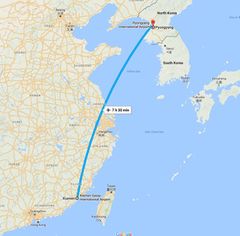Document:The Korea issue is now in the hands of the BRICS
| "Simon says: 'There's a 7½-hour flight from the BRICS summit in Xiamen, China to Pyongyang, North Korea so if Sergei Lavrov and the Chinese FM took that flight together to meet Kim Jong-un, it would have huge impact, and get the ball rolling on dialogue'." |
Subjects: BRICS, Xi Jinping, Vladimir Putin, Narendra Modi, Michel Temer, Jacob Zuma, Cyril Ramaphosa, Kim Jong-un, North Korea, South Korea
Source: The Duran (Link)
★ Start a Discussion about this document
Contents
The Korea issue is now in the hands of the BRICS
While reading into the internal political decisions of North Korea is far from easy, one gets a decidedly better perspective when one assesses North Korean decisions in a broader regional context.
Today’s apparent subterranean detonation of a nuclear weapon by Pyongyang, a weapon which is widely thought to be a hydrogen bomb, coincides with the commencement of the 9th annual BRICS summit in Xiamen, China.
The location of Xiamen vis-a-vis Pyongyang is shown on the map above.
While the BRICS summit is primarily concerned with financial, monetary and trade issues, geo-political issues are inevitably touched upon. This year in particular, with the border disputes between India and China resulting in a summer-long stand-off in the Doklam/Donglang region, the summit is seen as a place to test the extent to which India is willing to engage in dialogue over the matter with China after previously refusing to do so for months.
Many have commented that the proximate timing of India’s withdrawal of troops from Doklam/Donglang and the beginning of the BRICS summit was a calculated move to ease potential awkwardness at a summit aimed at increasing cooperation between BRICS member states which comprise Brazil, Russia, India, China and South Africa.
The North Korean issue was always likely to come up in some capacity, but this would have generally been peripheral to the dispute between two BRICS members (India and China).
Now however, due to North Korea’s nuclear test, the issues surrounding the Korean peninsula will almost certainly play a significant part in the discussions.
Is this what Pyongyang intended?
Either by coincidence or by design, the proximate timing of the nuclear test to the start of the BRICS summit means that the Korean ball is now very much in the BRICS court, especially when it comes to North Korea’s neighbours China and Russia who are the leading members of BRICS.
While a US attack on North Korea has always been unlikely, in spite of the disorganisation and inexperience of the Trump White House, with the leaders of the BRICS meeting in a neighbouring state, it is more or less certain that the US wouldn’t make any significant moves on the Korean peninsula at such a time.
This gives the BRICS a chance to make a statement on North Korea that could help instigate an early stage peace process, one that would be authored by countries that generally have a more trust based relationship with Pyongyang vis-a-vis the United States.
Such a thing could ironically help draw India into the fold as while India has disputes with China and remains on historically cordial terms with Russia, New Delhi has generally taken little interest to the Korean issue as it does not directly affect India. That being said, India has always enjoyed vastly better relations with North Korea than most western allied states in Asia and beyond, particularly where trade is concerned. India could also help lessen the controversy of its own nuclear weapons programme by showing a willingness to engage in a multi-lateral discussion on reducing tensions in a situation involving nuclear weapons.
While Brazil and South Africa would lend multi-continental weight to such a joint statement, it cannot be realistically said that Brazil and South Africa have the kinds of entrenched views on North Korea that many in Asia and North America do. Many in South Africa may however remember North Korea’s principled stand against the pre-1994 Apartheid regime. This could only help to enhance the prestige of such a BRICS statement on the matter.
While a nuclear test conducted by North Korea would clearly take time to plan, the date of the BRICS summit has been known for long enough that it would have allowed Pyongyang time to plan such a test to coincide with it.
Furthermore, with the US breaking international law in respect of raiding Russian diplomatic properties, Russia will if anything be more keen to demonstrate to the world, just how little the US is needed to interfere in the affairs of Asian and Eurasian countries.
While North Korea does not have any ‘allies’ per-se in the BRICS, it also does not have any antagonists or enemies.
This is therefore a golden opportunity for the BRICS and North Korea to meet half way and in doing so, the BRICS could also ideally satisfy the concerns of Seoul, all without allowing America to dictate the nature of events.
It could be a clever way to turn a potentially dangerous situation into a cautious win-win situation.
Comment by Simon
Simon says:
- "Perhaps. A mature and calming statement from the BRICS supporting the double freeze plan would be fine.
- "But your map suggests a better idea; instead of flying home after the BRICS if Lavrov and the Chinese FM took that flight together to meet Kim it would have huge impact, and get the ball rolling on dialogue.
- "They could follow up by going to Seoul to see Moon, perhaps symbolically crossing the land border.
